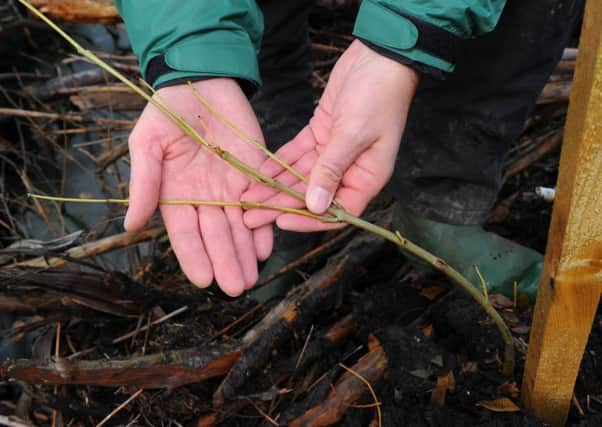Professor Fiona Burnett: Plant doctors are true heroes


So many of us have a stake in plant health – How many people can honestly claim they have never taken a walk in a park, or conquered a Munro, or quite literally stopped to smell the roses? Not to mention the fact that we all rely on plants as a vital food source. While they underpin our whole ecology, the health of our flora doesn’t attract the same interest or funding as that of our fauna. However there is a wealth of vital work going on to protect our plants right here in Scotland.
The crop clinic at Scotland’s Rural College (SRUC) is a working example of a plant doctor’s surgery where there are daily diagnoses of some of the ugliest of Scotland plant health problems such as potato soft rots or pesticide-resistant wheat pathogens. The crop clinic is supported by current research projects into a diverse range of plant health problems such as the barley disease ramularia, detecting and reducing pests and work to reduce the impact of the deadly fungal disease of Scots pine – Dothistroma needle blight.
Advertisement
Hide AdAdvertisement
Hide AdAnd it is perhaps thanks to those gentle giants of the plant world, our trees, that plant health has moved up the agenda. When ash dieback swept the country, we saw much loved landscapes irreparably changed by widespread tree deaths
Pests and diseases of food crops also have huge social, economic and environmental costs. They can reduce crop yields dramatically; indeed plant diseases are thought to reduce the potential global crop yield by a third.
This has obvious impacts on food security and food prices, as well as presenting enormous environmental and economic challenges.
Yet while plant health is vital to all of us, protecting plants is no easy task. Take agriculture. Pesticide usage is contentious – they add hugely to farmers’ costs of production and get a very mixed press with the public. They are heavily regulated to protect human health and the environment but this only adds to their cost. Better crop varieties with in-built resistance are often considered more sustainable but conventional plant breeding is expensive, it can take years and often by the time new varieties come to market there are new pests and disease threats or the pests and diseases that were targeted have adapted and can rapidly infect the new varieties.
Genetic modification can offer more rapid or targeted ways of increasing our plants’ resistance yet it is even more contentious than pesticide use, as the current GM ban in Scotland demonstrates.
Government regulations can help to reduce risks to our plants but a major issue in managing plant health is the number of people involved. People who come into contact with plants, pests and the diseases they carry, then invariably move those pests and diseases across the country. We have over 50,000 arable farms in Scotland. Layer on horticulture, forestry and related industries and numbers grow exponentially. Add in gardeners and the general public and that number explodes.
Another challenge is the global trade in plant species. Managing plant movement is one key to reducing health risks but plant regulations can only cope with known risks and work best in an industry context – for example, potato imports are carefully inspected at ports to prevent us accidentally importing unwanted pests. However, there are many factors outwith our control such as weather, wind and uncontrolled plant movements.
But enough about the problems facing our plants: what solutions are on offer? Much current crop health research, such as that done at SRUC, is looking at more integrated ways of managing disease risk – with the aim of maintaining yields but reducing reliance on pesticides. Targeted treatment also presents exciting opportunities, instead of treating entire fields, new technology – such as crop scanning and satellite imaging – means farmers need only use chemicals where they are really required. Sophisticated diagnostic tests mean that in some cases you can screen rapidly for multiple plant problems. Innovations like this could see allow the development of plant passports that would reflect a clean bill of health.
Advertisement
Hide AdAdvertisement
Hide AdPlant health is crucial not only to Scotland, but to the world, and it something we all need to understand better, so we can help solve the problems our plant life faces. Of course, as a crop doctor I might be biased, but you should be too, your life depends on them.
• Professor Fiona Burnett is head of SRUC’s Crop and Soil Systems Research Group, www. sruc.ac.uk